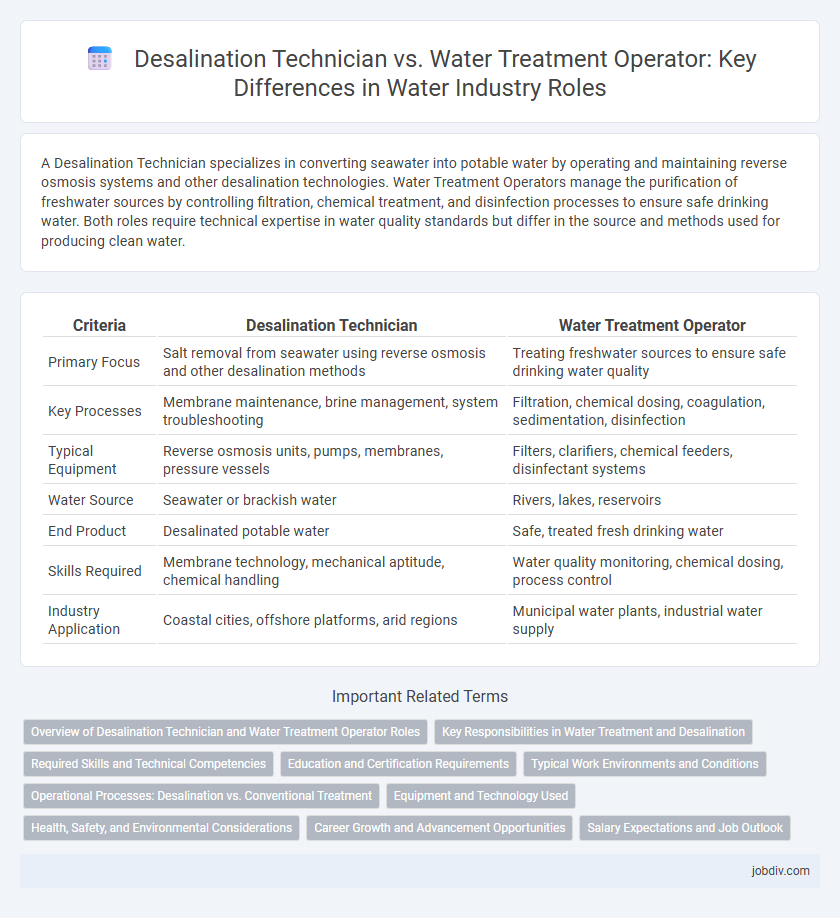A Desalination Technician specializes in converting seawater into potable water by operating and maintaining reverse osmosis systems and other desalination technologies. Water Treatment Operators manage the purification of freshwater sources by controlling filtration, chemical treatment, and disinfection processes to ensure safe drinking water. Both roles require technical expertise in water quality standards but differ in the source and methods used for producing clean water.
Table of Comparison
| Criteria | Desalination Technician | Water Treatment Operator |
|---|---|---|
| Primary Focus | Salt removal from seawater using reverse osmosis and other desalination methods | Treating freshwater sources to ensure safe drinking water quality |
| Key Processes | Membrane maintenance, brine management, system troubleshooting | Filtration, chemical dosing, coagulation, sedimentation, disinfection |
| Typical Equipment | Reverse osmosis units, pumps, membranes, pressure vessels | Filters, clarifiers, chemical feeders, disinfectant systems |
| Water Source | Seawater or brackish water | Rivers, lakes, reservoirs |
| End Product | Desalinated potable water | Safe, treated fresh drinking water |
| Skills Required | Membrane technology, mechanical aptitude, chemical handling | Water quality monitoring, chemical dosing, process control |
| Industry Application | Coastal cities, offshore platforms, arid regions | Municipal water plants, industrial water supply |
Overview of Desalination Technician and Water Treatment Operator Roles
Desalination Technicians specialize in operating and maintaining equipment that removes salt and impurities from seawater to produce potable water, ensuring efficient reverse osmosis and distillation processes. Water Treatment Operators manage the treatment of raw water sources, using filtration, chemical dosing, and disinfection methods to meet regulatory standards for safe drinking water. Both roles require expertise in monitoring water quality parameters, equipment troubleshooting, and compliance with environmental regulations, but Desalination Technicians focus more on saline water systems while Water Treatment Operators handle freshwater sources.
Key Responsibilities in Water Treatment and Desalination
Desalination technicians specialize in operating and maintaining desalination plants, focusing on processes like reverse osmosis, thermal distillation, and salt removal to produce potable water from seawater or brackish sources. Water treatment operators manage the purification and distribution of freshwater, overseeing chemical dosing, filtration, and disinfection to ensure compliance with environmental and health standards. Both roles require monitoring system performance, troubleshooting equipment, and maintaining safety protocols to deliver clean water but differ in the specific technologies and water sources they handle.
Required Skills and Technical Competencies
Desalination Technicians require expertise in reverse osmosis membrane systems, high-pressure pump maintenance, and water chemistry analysis to efficiently convert seawater into potable water. Water Treatment Operators must master chemical dosing, biological process management, and real-time monitoring of purification systems to ensure safe, compliant water quality. Both roles demand strong mechanical aptitude, troubleshooting skills, and knowledge of environmental regulations specific to water treatment technologies.
Education and Certification Requirements
Desalination Technicians typically require specialized training in reverse osmosis, membrane systems, and saltwater chemistry, often obtained through technical schools or associate degree programs. Water Treatment Operators usually need a high school diploma or equivalent, followed by state-specific certification that covers purification processes, chemical treatment, and regulatory compliance. Both roles demand ongoing education and certification renewals to stay current with evolving water treatment technologies and safety standards.
Typical Work Environments and Conditions
Desalination Technicians primarily work in coastal or marine settings, operating complex desalination plants that convert seawater into potable water under rigorous safety protocols. Water Treatment Operators typically function in municipal or industrial facilities, managing water purification and wastewater treatment systems often involving chemical handling and routine maintenance. Both roles demand adaptability to variable conditions such as outdoor exposure, shift work, and compliance with environmental regulations to ensure water quality standards.
Operational Processes: Desalination vs. Conventional Treatment
Desalination technicians specialize in operational processes involving reverse osmosis, thermal distillation, and advanced membrane filtration techniques to remove salt and impurities from seawater. Water treatment operators focus on conventional treatment processes such as coagulation, sedimentation, filtration, and disinfection to purify freshwater sources. Both roles require monitoring system performance and ensuring regulatory compliance, but desalination involves managing highly specialized equipment to handle high salinity and complex brine disposal.
Equipment and Technology Used
Desalination technicians operate advanced reverse osmosis systems, ultrafiltration units, and thermal distillation equipment to convert seawater into potable water, focusing on membrane maintenance and process optimization. Water treatment operators manage conventional filtration systems, chemical dosing equipment, and biological treatment technologies to purify freshwater sources, ensuring compliance with water quality standards. Both roles require expertise in monitoring automated control systems and troubleshooting mechanical components to maintain efficient water purification processes.
Health, Safety, and Environmental Considerations
Desalination technicians specialize in managing salt removal processes, requiring rigorous adherence to chemical handling protocols and pressure system safety to prevent exposure to harmful substances. Water treatment operators focus on contaminant removal and biological monitoring, ensuring pathogen control and safe chemical dosing while minimizing environmental discharge impacts. Both roles prioritize workplace safety standards and environmental regulations to protect public health and preserve aquatic ecosystems.
Career Growth and Advancement Opportunities
Desalination Technicians typically experience rapid career growth due to increasing global demand for advanced salt-removal technologies, offering specialized skill development in membrane systems and reverse osmosis processes. Water Treatment Operators often advance through certifications such as the Grade III or IV Water Treatment Operator licenses, gaining broader expertise in chemical dosing, biological treatment, and compliance with EPA regulations. Both careers provide pathways to supervisory roles, but desalination technicians benefit from emerging opportunities in coastal and arid regions investing heavily in sustainable freshwater solutions.
Salary Expectations and Job Outlook
Desalination Technicians earn an average salary ranging from $45,000 to $65,000 annually, driven by specialized skills in saltwater purification technology and membrane systems. Water Treatment Operators typically receive salaries between $40,000 and $60,000, reflecting responsibilities in managing and optimizing freshwater quality processes. Job outlook for Desalination Technicians is expanding due to increasing demand for sustainable water resources, while Water Treatment Operators maintain steady employment growth linked to regulatory compliance and infrastructure upgrades.
Desalination Technician vs Water Treatment Operator Infographic

 jobdiv.com
jobdiv.com